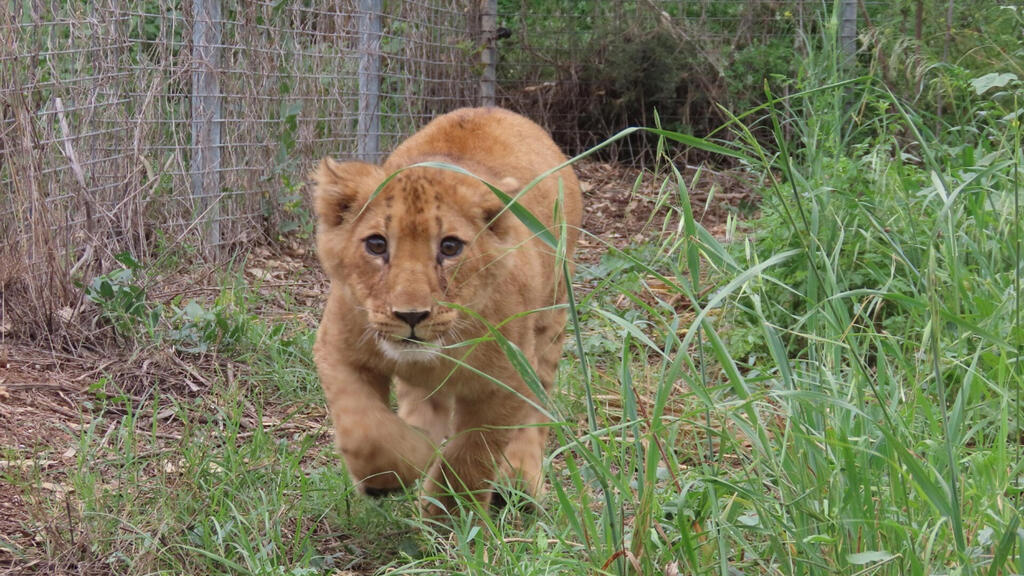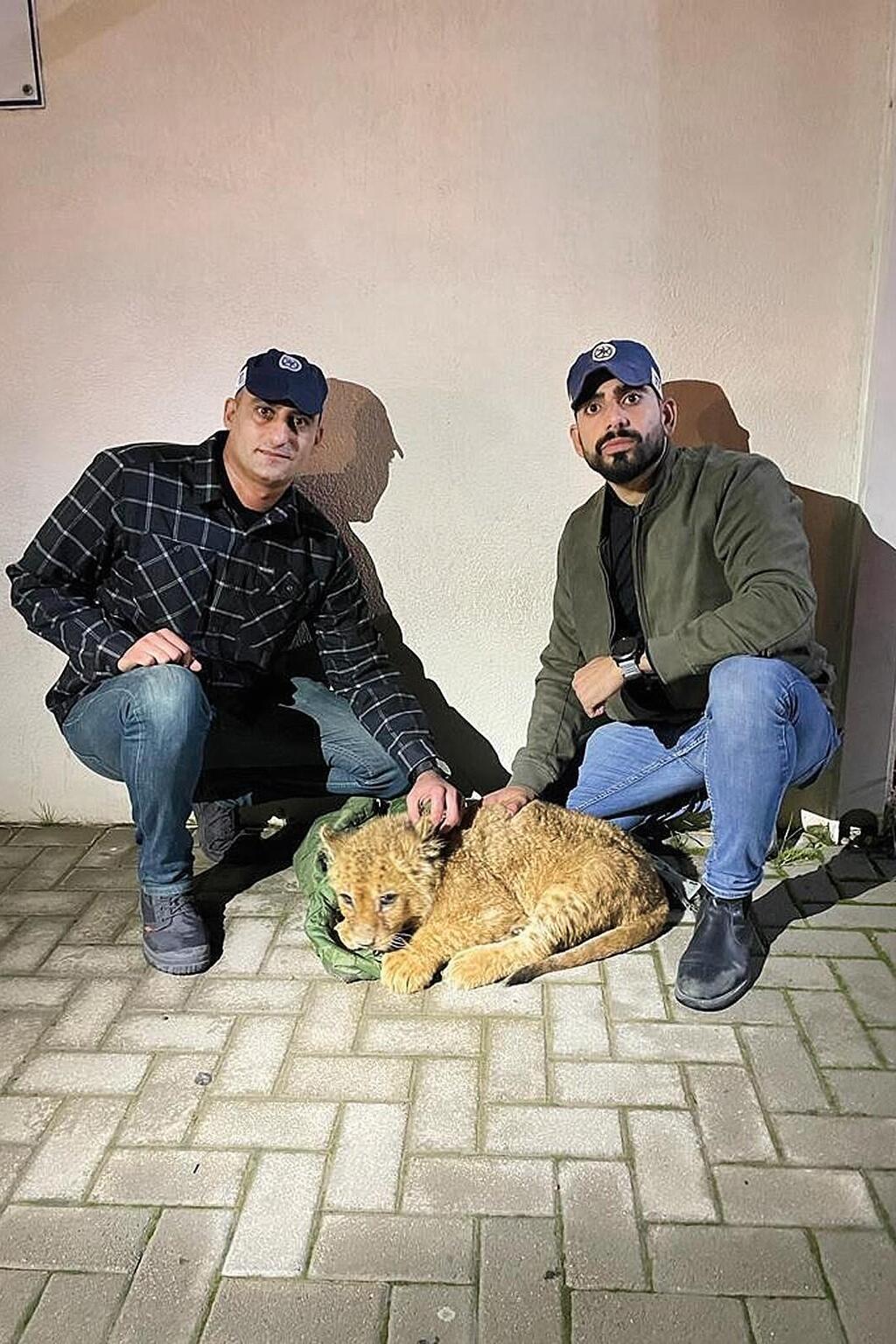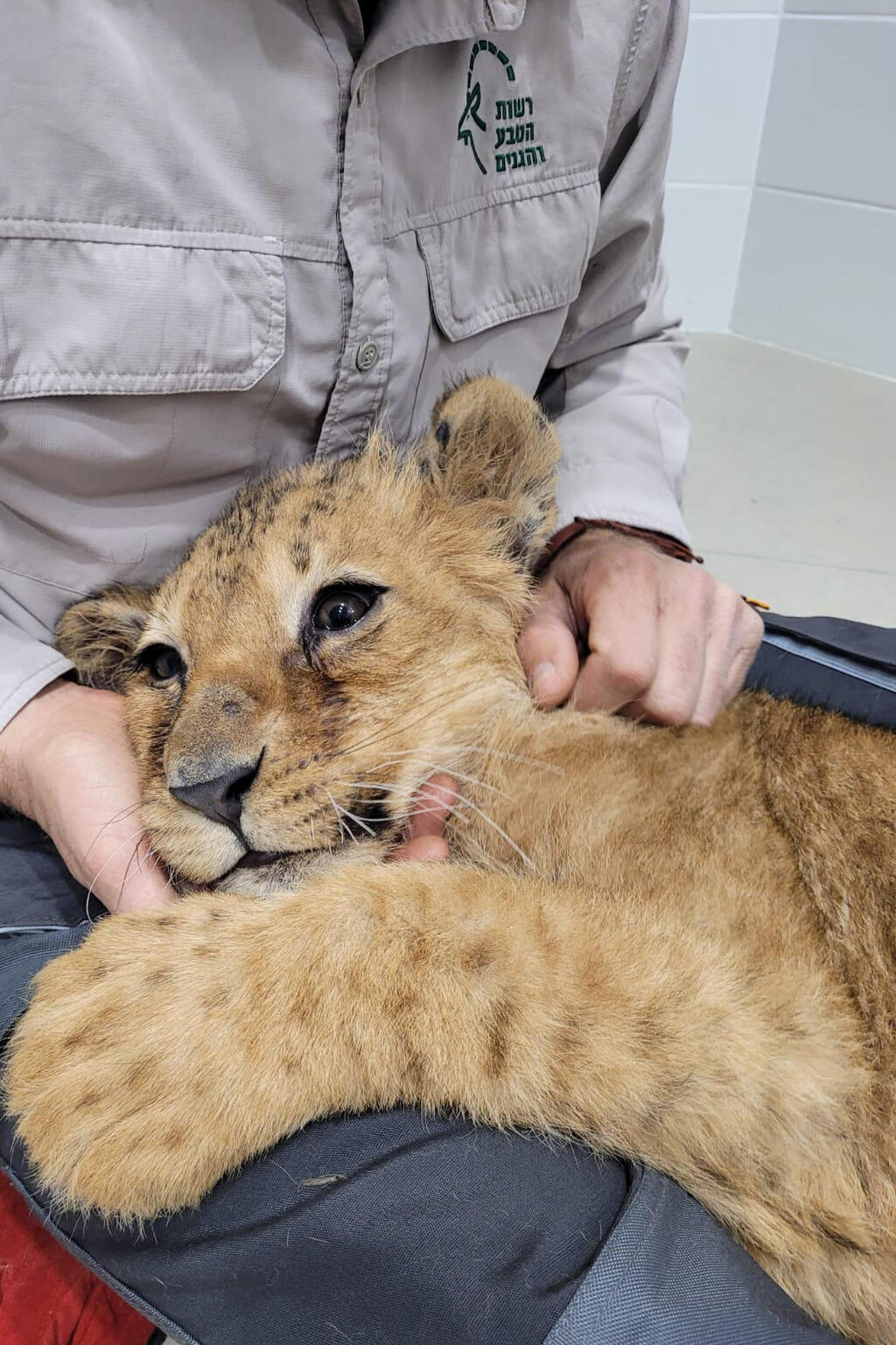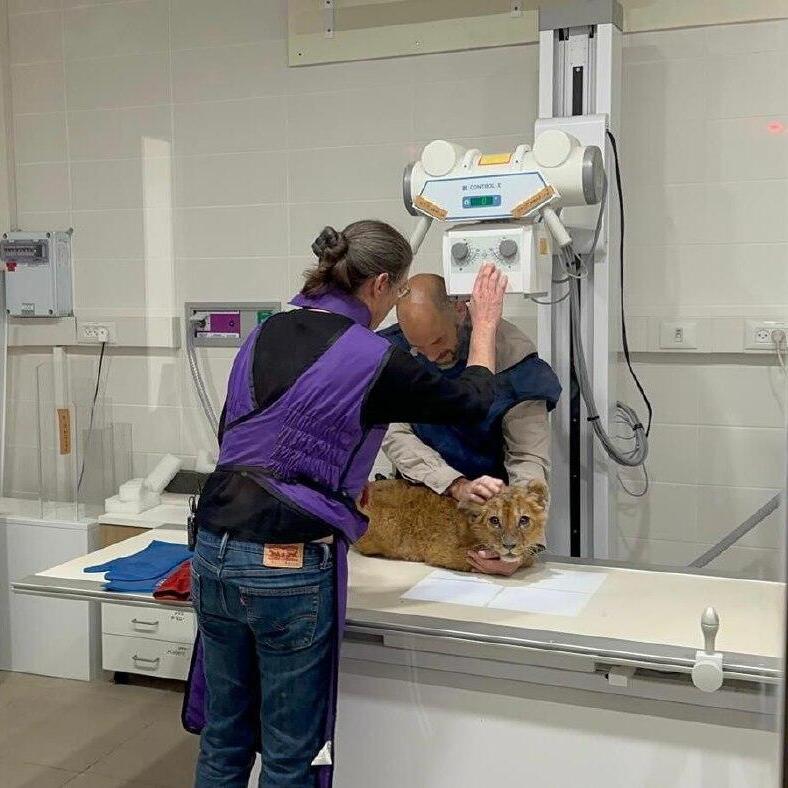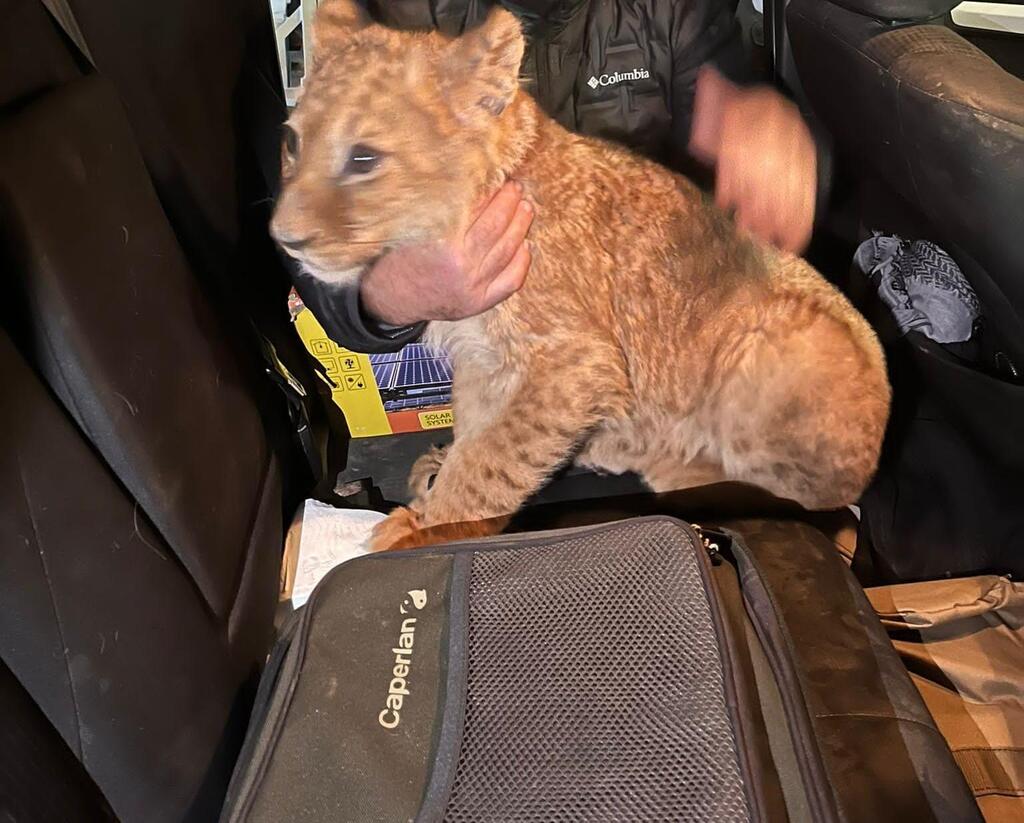Getting your Trinity Audio player ready...
The little lion cub examined the new guests who arrived for a visit. A peek into the secured facility in the center of Israel, where he was kept in solitary confinement for his own protection, made it possible to see his fearful, ashamed eyes.
Last week, the lion cub's caretakers decided to allow him to go outside to the fenced-in yard, but during the first few hours of the simulated freedom he remained in the warm structure they had prepared for him - a kind of a suite with several rooms, carpets, a corner that simulates a small jungle, and pipes and rings to play with.
"One of the caretakers entered and tried to convince him to go out," says Yedioth Ahronoth photographer Tal Shahar, who went to the facility to record the rare moments, "but he remained in the corner of his cell and looked frightened. I felt a little sorry for him."
Two days later, the cub named Abu Malek had already gained courage. The weather got warmer, and the cub that was rescued from captivity in Israel began to get out. At first he hesitated, due to all the hardships he has gone through, but his caretakers encouraged him, and in a short time the cub felt safe enough to play outside and enjoy direct sunlight.
He is an active and athletic cub, which plays and has fun in the yard. Anyone who has raised a domestic cat knows these cat games. he hides and jumps, clings to the caretakers' legs and enjoys jumping on their backs, like playing piggyback.
Only it is not a cat but a lion cub. "He's getting a little too big and aggressive toward his human caretakers. It's not easy to play with such a cub," says Dr. David Eshar, the chief veterinarian and director of the Safari Wildlife Hospital in Ramat Gan, who comes to the facility to treat it.
Abu Malek, today already about five months old, weighed 15 kg. when he arrived at the Safari. Now he weighs 35 kg., but the physical dimensions are only a small part of the story.
"HE had social deficiencies," Eshar explains. "He was a nursing cub, who was kidnapped from his mother at a very early age and did not receive the rich and nutritious milk which contains antibodies against diseases. He had fears and anxieties. Lions are sociable creatures that need to play and lean on someone like them."
The name Abu Malek has stuck to the little cub because that's what he was called by his captors in the TikTok videos they were distributing; these videos led law enforcement authorities to search for the cub.
He was held in Israel against the law and was traced in February to an abandoned building with a tin roof in central Israel. "I remember this day," recalls Inspector Netanel Shoshana, the intelligence officer of the Southern Border Police Department who was a part of the force that broke into the apartment where the cub was kept.
"From the afternoon we began to receive clues to its whereabouts. At night we received the golden information that led us to the apartment itself. When we arrived, we heard the heavy breathing of an animal, but at first we could not identify its source. The place was dark," the inspector says.
"We entered an inner room and then discovered the cub tied by the neck with a makeshift rope leash attached to a hook on the wall. The rope was short, and the cub had nowhere to go. It was tucked away on the side of the cell," he continues.
"I noticed leftover food around it that had been brought to it, but the food seemed inedible. There was a bowl of water, but it couldn't get its head close enough to drink from it. All in all, the conditions were horrible, certainly not suitable for the king of animals. It looked weak and exhausted," he says.
"At first we thought it was given sedatives. But the fatigue, hunger and cold probably just took their toll," Shoshana concludes.
According to estimates, the cub was smuggled to Israel alone from Jordan via the Allenby Bridge, but the Israel Border Police do not rule out the possibility that he has a sibling which has not been located yet.
"Our indications today point to only one cub, but we are constantly checking so we won't be missing anything," says Shoshana.
Even after the cub's release, a happy ending was still far away. Immediately after Shoshana and his team rescued him from captivity, the cub was taken for a series of tests and from there to isolation.
Being separated from his mother at such a young age and raised by people who knew nothing about wild animals must have had an effect. "The ramifications of captivity can be both medical and psychological," explains Eshar.
"From a medical point of view, even in the wild, lions are sensitive when it comes to certain nutritional deficiencies. And it is more difficult if they are kept in captivity, even in very orderly places," the veterinarian explains.
"Therefore, it is not surprising that when Abu Malek was brought to us we recognized signs of nutritional deficiencies. He was probably given solid food too soon. He had trouble walking. He arrived swaying. And he had problems with his eyes. He also didn't receive vaccinations, and some of the diseases to which he may be exposed are fatal," he says.
And in terms of its mental health, what did you discover?
"He lacks confidence, which lions usually gain from cuddling next to a warm body. He has no one to play with and no one to get personal security from. We hope that in the future he will be able to connect with other lions.
"He is currently in trauma. He needs to learn on the one hand not to be afraid of humans, and on the other hand to know how to get along with lions."
How do you fill these deficiencies for him?
"From the videos circulating online, we assume that in the beginning there may have been two cubs. Unfortunately, we do not know what happened to the second cub. We were hoping that it would be found, because it could be very important if we saved both of them and keep them together.
"So far, it has not happened. And we don't have a cub of his age that can join him. The caretakers are his friends. We have a small group of caretakers at the facility who are the only ones allowed to play and feed him, and they fill in some of the deficiencies.
"But it's getting hard. The cub injures them. He scratches and bites and does what a young lion should do. They come out scratched and bruised, but they do it every day because it's important."
Providing homes for wildlife from Odessa to Savannah
While Abu Malek was getting stronger, the Israel Nature and Parks Authority was looking for a permanent home for him. The authority received many offers to take in the lion, but eventually narrowed down the options to two sanctuaries in South Africa.
One of them belongs to the Warriors of Wildlife located in Simbonga and the other belongs to the organization Panthera Africa, a sanctuary for any captive-bred big cats. This is an ecological organization, a kind of local paradise full of trees and a natural spring.
Ori Linial, head of captive wildlife maintenance at the Nature and Parks Authority, as well as his team wrote down the pros and cons of the two sanctuaries, recognizing that this is the place where the cub is expected to spend the rest of his life.
Finally, they chose Warriors of Wildlife because it has experience in rehabilitating and absorbing wildlife. Following the war in Ukraine, the organization rescued nine lions from the zoo in Odessa. In the absence of visitors, the owners could no longer keep them and the frequent bombings posed a danger.
The Warriors of Wildlife, or WW, have experienced rehabilitating wildlife. WW has already rescued and assisted in the transfer of a total of 37 lions and one tiger from all over Ukraine to South Africa, and also rescued two white lions.
The sanctuary itself is not open to the public and the lions can only be seen by setting an appointment in advance. "It is a damaged animal," Linal explains. "It doesn't know it is a lion. It needs to go through a long rehabilitation process where it will learn to be a lion, and this is the field of expertise of such sanctuaries and less of zoos."
At WW, Abu Malek has a lion cub its age waiting for him, and the Israeli caretakers hope that the two cubs will be able to bond and learn from each other.
"It was very important to us that Abu Malek reaches a sanctuary where there will be natural areas," says Linial, "and that he won't be kept in a cage; it's important that this is more of a sanctuary rather than a zoo with a public display. We wanted him to be in a place where he has a chance to rehabilitate and connect with cubs of his age. This is his only chance."
One bright spot in this sad story is the number of people who asked to help this little cub.
"We received a lot of inquiries from lovely people," Linial says. "Some of them have agendas that we are less connected to, because they want to turn him into a pet, and that he will live in the company of humans and together with other animals that they rescue.
"We prefer an approach which involves turning him into an animal that lives among his own species, in a country where the species exists in Africa, under natural conditions as much as possible," according to the wildlife expert.
"We received quite a few inquiries. Twelve of them were relevant, with major facilities that could make a good future for the cub. We received inquiries from Europe, Africa, South Africa, Kenya, Senegal, and also from Jordan, where there is an international organization that we helped in the past."
Linial refers to the organization Four Paws, which has previously assisted in rescuing wild animals from the Gaza Strip through Israel. In 2019, they rescued 47 animals from the Gaza Zoo, including five lions.
Two of the lions were taken to a sanctuary in South Africa. "The facility in Jordan is excellent, but we weren't sure it was the right place for this specific cub. What helped us decide was that there was a possibility of bonding with another cub."
"We wanted to transfer it to Kenya, but it didn't work out," reveals Yatir Shamir, head of the enforcement division at Israel Nature and Parks Authority. "We searched in Europe, where there is a shelter in the Netherlands that deals with this. We also checked in the United States.
"But in the end we thought that South Africa was the right place. I wish to emphasize that the case of Abu Malek is only the tip of the iceberg. It's just one of many. The illegal trade in wild animals is more popular in birds and reptiles, and there the trade volumes are larger. This trade finances global terrorism. It is the third largest illegal trade in the world."
On the wings of Zion
The bureaucratic procedure is another obstacle to overcome. Sending a lion abroad requires a lot of approvals.
"Since the lion is a protected animal, under international treaties the process is more meticulous. If everything goes smoothly, within two or three weeks we will receive a permit from the other side and book a flight," according to Shamir.
"One of the things we insisted on was a contract and a commitment from the WW organization stating that he will not be used for trade or breeding, and he will be provided with good conditions. They did not hesitate for a moment to issue us such a contract. We want to accompany this cub and see that he goes to a good place," he says.
Once he arrives at the sanctuary and connects with the other cub, the real challenge will begin.
"When you connect him with lion cubs his age, they teach each other boundaries, what is allowed and what is not allowed," Eshar explains, "just like with humans, who have their own rules."
"Lions his age, 4-5 months old, are already serious lions, like teenagers with lots of power. Someone needs to teach them how to behave in society and control this power, when to play and when to threaten," he says.
"Sometimes we see cubs who don't know these limits, and they may see every lion as a threat, and then straight away there is war. And, on the other hand, they don't know how to defend themselves, they don't know how to behave in a group," he adds.
"We want him to arrive at a home where he will stay for the rest of his life, without moving to another sanctuary. Usually, two cubs of the same size manage to bond after an acclimatization period."
Esh'har clarifies that the caretakers try not to get attached to the cub. "We don't call him Abu Malek. Even if someone invented a name for him, he keeps it to himself. He is not our pet. He is, unfortunately, a rather sad guest, who came without him or us asking," the veterinarian explains.
"Now we are taking care of him, trying to help him find a good home. When he gets there, they will pick a name for him. We don't own him. We are only his caretakers and doctors. And that's what he needs right now."
And yet, despite all the attempts not to get attached, the caretakers chose this week, in cooperation with his new caretakers from South Africa, a new name: Zion.
There are always obstacles when it comes to a lion. "The procedure is not over yet," says Linial. "We don't have final approvals from South Africa, nor do we have an airline that has agreed to fly him. Everything involved here is difficult."
6 View gallery
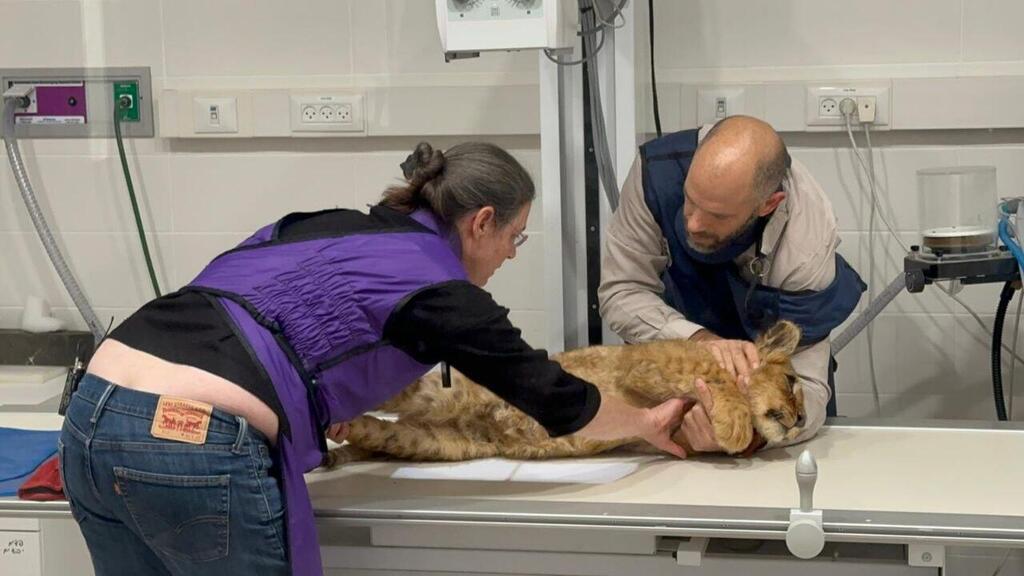

Abu Malek needs to learn how to be a lion again
(Photo: Shlomit Shavit, nature and parks authority)
"We have already built a special crate so that we can move the cub to his permanent place," according to Linial.
The airline rules for the transfer of the cub are well defined; according to the decisions of international organizations, the crate should have enough space to put in food and remove feces.
"We have many years of experience in transporting animals," says Linial. "It's quite expensive because the crate has to be reinforced and made of quality wood, but it's not a complex construction."
He says that the cub "will not be anesthetized on the flight since its very dangerous to transport an anesthetized wild animal. If something happens while it's sleeping, you need a vet nearby. It's customary to give a little sedative, better in a low dose."
In conclusion, Linial says, "the transfer itself is complex. But I allow myself to be a little optimistic, because the people from the WW sanctuary who work with us are great. They asked me if we would mind if they changed his name from Abu-Malek."
"They said they would be happy to give him a name that represents the place where he came from. I said that not only do we not mind – but that we would even be happy. And so we changed his name to Zion."
The certain thing is that Abu-Malek/Zion will gain one more than just a new name: a home.


